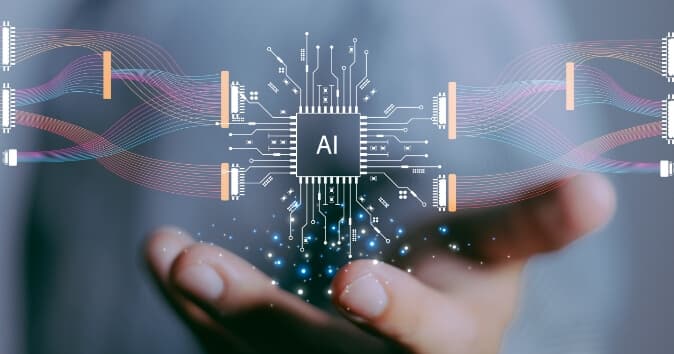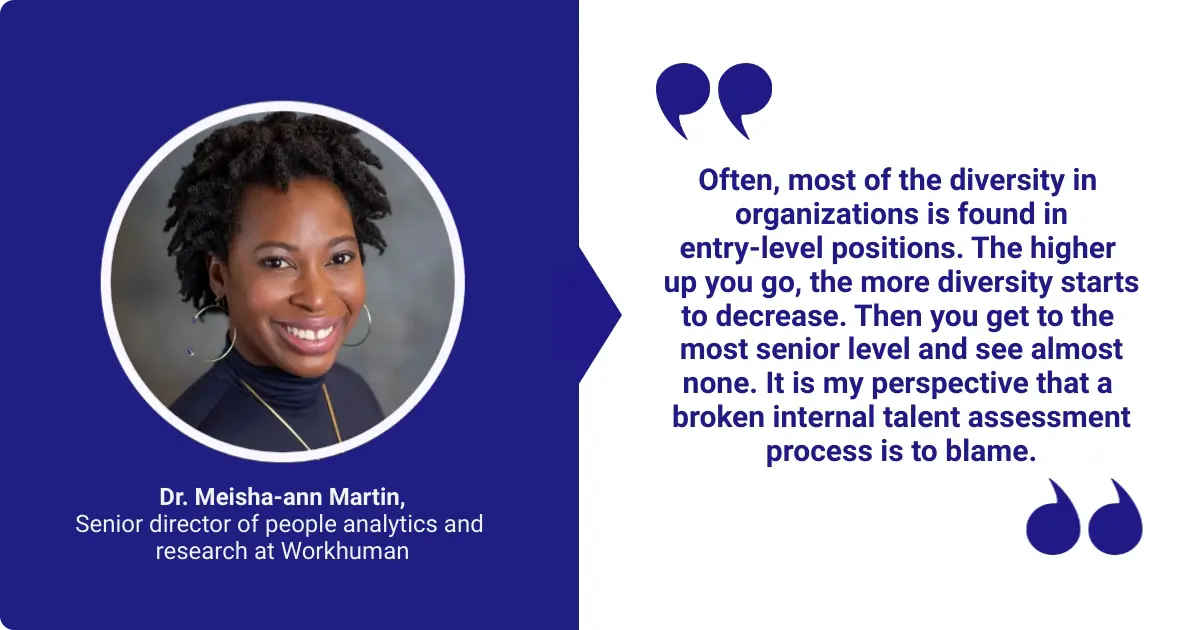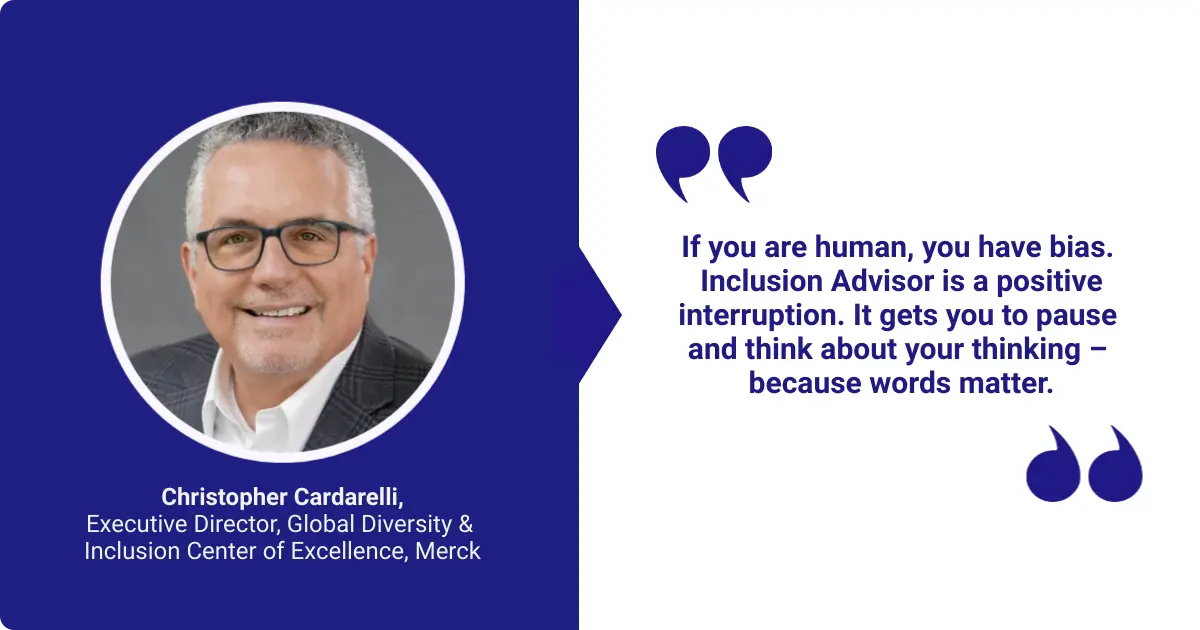How AI and DEI Can Work in Tandem

As Artificial Intelligence (AI) begins to grow in popularity and power, it’s imperative that leaders learn to harness this technology for good. One very strong positive impact AI can have on your workforce is supporting your team’s diversity, equity, and inclusion initiatives.
With countless AI tools available to help your staff with everything from recruiting and interviewing to using more inclusive language, there’s a software solution in existence to meet virtually any need.
Read on to learn more about how you can integrate AI and DEI to create a more fair and amicable environment within your company.
Understanding what “Artificial Intelligence” encompasses
While many people are now familiar with generative AI tools, such as ChatGPT, that is far from the only AI tool available to working professionals. To better understand AI, it can help to explore the various AI models available, their unique capabilities and use cases, and how they can create measurable change within your organization. Take a look at some resources and tools below:
Generative AI tools
Systems such as ChatGPT, Copilot, and Gemini can all help with content creation, copywriting, and even writing job descriptions. Recent Workhuman research found that 42% of employees surveyed were already using generative AI at work once a week or more, showing how quickly these tools are being integrated into daily life in the workplace.
Virtual reality and augmented reality technologies
VR and AR technologies, such as Saritasa, can be especially useful in training your staff on more inclusive DEI practices. These systems can walk your employees through immersive DEI training scenarios to help them build skills to support greater inclusion in your organization.
Also, the private nature and gamification of these tools can help your employees learn without the fear of failure, creating deeper, more organic educational experiences.
AI-powered recruiting and interviewing tools
There are countless tools available for scheduling and conducting interviews, as well as assessing candidates’ skill sets. Tools like Calendly can make scheduling a breeze, while tools like Interviewer.AIOpens in a new tab can conduct asynchronous video interviewsOpens in a new tab, saving your recruiting team time and money.
Tools like this can also help your team evaluate candidates more objectively and with less bias, deepening the sense of fairness and equity at your company.
How AI technology can support your company’s DEI efforts
AI development has come a long way, with many tools now capable of helping organizations see things more clearly through a DEI lens. Here are some helpful ways these technologies can boost inclusivity in your organization:
Discover proven strategies to build an inclusive culture backed by insights from Deloitte, Gallup, scholars, and our customers. Download the report now!
Identify pay discrepancies
Because AI can conduct deep analyses of your employees’ salary, bonus, and benefit information at breakneck speed, it can also quickly identify pay disparities. These data sets can help your finance, and HR teams make changes to create more pay equity and inclusion within your organization.
Increase accessibility
AI tools can be extremely usefulOpens in a new tab for helping individuals with visual challenges, hearing impairments, or mobility issues gain access to things they may not have otherwise been privy to. AI can generate alt text for images, captions for videos, or be programmed to auto-scroll an individual’s computer, making web navigation and software use easier.
All of these AI training tools can make content and learning more accessible for everyone, which can contribute to productivity and, ultimately, career growth.
Advocate for underrepresented groups
When you allow AI to analyze data about existing employees, it can identify areas for further DEI development within an organization. For example, AI may be able to identify that an organization needs more women or POC in leadership positions or the C-Suite.
Making these adjustments to your management team can help you avoid human oversight in analytics and hiring, as well as support diverse perspectives through the structure of your team.
Want to learn more about the positive changes you can make? Download our inclusivity guide here.

Encourage more inclusive language
Another way AI can boost DEI in your organization is by monitoring internal and external communications to encourage the use of more inclusive language in the workplace. Tools like Workhuman’s Inclusion Advisor can empower your team with helpful tips and suggestions to avoid gendered, bias, and unhealthy workplace rhetoric.
This can be especially useful at large companies where it can be more difficult to keep track of every piece of content that’s being released.
Micro-coaching training tools like this may also help your team members learn to create more inclusive job descriptions, helping you widen your talent pool and bring a wider array of talented individuals into your business.
Want to see firsthand how Inclusion Advisor helped support DEI at Merck? Download the report here.

Understanding the risks and pitfalls of AI
While AI can have a lot of positive effects on your company’s DEI efforts, there are also some risks and challenges of AI that you need to watch out for. Here are some issues to be aware of:
Algorithmic bias
Because it’s humans who create the algorithms AI uses to function, the biases of those programmersOpens in a new tab often become a part of the software. That means that gendered, racial, and other biases can be subconsciously programmed in, often due to the lack of diversity within the teams of developers creating these systems.
This makes sense when considering the fact that only 2 in 10 software developers nationwide are women, and less than 1 in 10 are Black or Latinx.
In order to combat these issues, end users of these programs, such as HR and recruiting professionals, need to first be aware that they exist. With that full scope of awareness, they can set up manual systems to check and combat these biases.
Risks to data privacy and security
Because AI systems are capable of quickly analyzing and reporting on large data sets, they also tend to create and store a lot of information. This can create greater implications for data privacy and security, as so much crucial information is being stored within these systems.
To mitigate some of these concerns, it’s important to be transparent with applicants and existing employees about what data is being collected and how it’s being usedOpens in a new tab. You may also want to give individuals the choice to opt out of data collection and storage if that’s what they prefer.
Discrepancies in digital literacy
Because all users will have different levels of digital literacy when utilizing various tools and software, their outcomes may also be very different. While some users may have immediate mastery of the program or clear ease of use, others may struggle to use the new technology and systems effectively. This is something to be aware of when assessing the efficacy of tools and technologies.
Conclusion
With an awareness of the associated risks, AI applications can greatly impact your company’s DEI efforts. Utilizing tools such as these can help you keep your focus on the important DEI work in your company. By finding salary discrepancies, encouraging more inclusive language, and identifying diverse candidates for open roles, AI and DEI can work in tandem to create a deeper sense of belonging in your workplace.
About the author
Anna Picagli
As an RYT500 yoga instructor and a Reiki Master Teacher, Anna is an advocate for holistic wellness, especially within the workplace. She’s extremely passionate about the brain-body connection and exploring how mental and physical wellness intersect.
Anna has experienced firsthand how chronic stress, overworking, poor management, and other organizational issues can lead to extreme burnout. Knowing the impact that a toxic work environment can have on a person’s body, psyche, and general sense of well-being, she now works to direct others away from facing the same fate.
As Workhuman’s Senior Content Specialist, Anna is a regular contributor to Workhuman iQ reports and aims to create resources that company leaders can reference to help improve their culture and empower their employees, creating healthier workplaces for everyone.
In her free time, she’s an avid solo traveler, a voracious reader, and a seasoned home chef. You can learn more about Anna’s work on LinkedIn or through the Yoga Alliance.